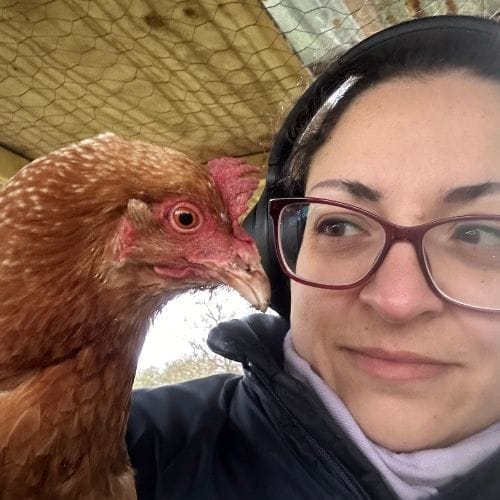
Affiliate Disclosure
Some links on this website are affiliate links.
That means if you click and buy something, I may earn a small commission — at no extra cost to you.
I only recommend things I actually use, love, or would happily hand to a friend while saying, “Trust me.”
Affiliate income helps keep this blog running, the chickens fed, and the espresso flowing ☕🐓
You are never obligated to buy anything through these links — but if you do, grazie mille for supporting this chaotic corner of the internet.
This site uses affiliate links and I may earn a small commission when you use my links and make a purchase without incurring additional fee yourself. Many thanks for supporting this website.
Please click here for more details.
Do Olives Boost Your Chickens’ Health? Let’s Find Out
Yes, chickens can eat olives—but only in moderation and without the pits.
Olives provide healthy fats, antioxidants, and support immune and heart health.
Avoid high sodium by rinsing cured olives or choosing salt-free ones.
Feed as a treat 1–2 times per week, never as a main meal.
Watch your flock for changes and adjust as needed.
📦 Pin it, share it, save it for later. Your hens deserve the Mediterranean diet too.
Do Olives Boost Your Chickens’ Health? Let’s Find Out
As a devoted backyard chicken mama, I’m always digging into new ways to spoil my flock while keeping them clucking along in tip-top shape. Raising chickens isn’t just feed-and-forget. It’s about helping these feathered drama queens thrive—and maybe blessing your breakfast with golden-yolked eggs in the process.
So imagine my curiosity when I stumbled upon something unexpected in the pantry: olives. Yep, those briny little beauties we humans toss into martinis and pasta salads. Could they actually benefit chickens, too?
Turns out—yes, with caveats. Here’s everything you need to know about feeding olives to chickens: the nutritional perks, the do-not-dos, and why your hens might just become olive fanatics.
🫒 First Things First: Why Olives?
A. What Makes Olives Special?
Olives are tiny fruits with serious nutritional punch. Besides starring in Mediterranean cuisine, they’re loaded with healthy fats—especially monounsaturated fatty acids like oleic acid, which are famous for their heart-protective properties. You’ll also find vitamin E, vitamin K, and a whole lineup of antioxidants in every bite.
Not bad for something you usually skewer on a toothpick.
B. Chickens Need Nutrients Too
Your average chicken isn’t counting macros, but the nutrients in olives can still make a difference. Those healthy fats = energy and growth support. Antioxidants = stronger immune systems. In short: olives aren’t just tasty; they’re functional. When added to a balanced flock diet, they can boost health, vitality, and egg quality.
🍳 Health Benefits of Olives for Chickens
A. Supercharged Immunity
One of the best perks? Antioxidants. These compounds help fight oxidative stress—the biological wear and tear that can weaken your chickens’ immune defences. A few olives here and there can strengthen their resilience and potentially reduce the risk of illness. And yes, healthy hens = better eggs. Win-win.
B. Happy Chicken Hearts
Monounsaturated fats are the good guys in the fat world. For chickens, they help support cardiovascular health—especially important for laying hens who need strong circulation for peak performance. Good heart health = better stamina, fewer issues, and more egg-laying power.
C. Egg-cellent Egg Boost
Want stronger shells and richer yolks? There’s anecdotal evidence and nutritional logic suggesting olives can contribute to better egg production. The fats and vitamins in olives may give your hens just the edge they need to lay eggs that are not only plentiful but more nutritious too.
🚫 Before You Toss the Jar Into the Coop
A. Salt Alert: High Sodium Warning
Here’s the catch: most olives are cured in brine. Translation? Salt bombs. And chickens aren’t built to handle that kind of sodium. Too much can lead to dehydration, kidney stress, or worse.
Fix it: Rinse olives thoroughly before feeding. Or better yet, use unsalted, raw, or oil-cured options. Always treat olives as a snack, not a staple.
B. Olive Prep 101
Want to treat your flock safely? Follow these basic prep tips:
De-pit them – Olive pits are choking hazards. No exceptions.
Chop them small – Helps with digestion and reduces any "hen pecking order" food fights.
Don’t overdo it – Stick to a once or twice weekly treat.
Mix it up – Blend olives with other healthy snacks like veggie scraps or oats to create a nutrient-rich flock feast.
🧺 How to Add Olives to a Balanced Chicken Diet
A. Think “Supplement,” Not “Staple”
Olives can complement a chicken's diet, but they should never replace it. Your flock’s foundation should be a high-quality layers feed with consistent access to clean water. Think of olives as the cherry on top—not the cake.
For extra variety, combine chopped olives with other flock-friendly foods like:
Chopped apples (no seeds!)
Berries
Cucumbers
Leafy greens (spinach, kale)
Oats
This keeps things interesting and maximizes nutrition across the board.
B. Keep an Eye on the Girls
Any time you add something new to your chickens’ diet, observe. Are they acting differently? Are egg shells thinner? Any signs of digestive upset? Watch closely after introducing olives.
Every flock is different. One hen might thrive on olives; another might turn up her beak. Adjust according to what you see, not what you assume.
✅ Final Cluck: Should You Feed Olives to Chickens?
Short answer: Yes—if done right.
Olives offer an impressive list of benefits for chickens: immune support, heart health, and potentially better eggs. But they also come with a sodium caveat. With proper prep (and moderation), olives can be a brilliant, flavorful addition to your flock’s treat rotation.
So go ahead—rinse ‘em, chop ‘em, and serve ‘em up like the Chicken Zia you are. Just remember: olives are like wine or hot baths—best in small doses. Your hens will thank you with happy cackles, healthy feathers, and gorgeous golden yolks.

Zia Paola
Zia Paola is a burnout survivor, chicken enthusiast, and former veterinary surgeon turned digital mischief-maker. She writes from her semi-chaotic smallholding in the UK, where she splits her time between unhinged chickens, rustic recipes, and helping others reclaim their lives from hustle culture. You can find her ranting lovingly about slow living, food, and freelance freedom at www.badinfluenzia.com.

Get mildly chaotic life advice, anti-burnout rants, and unsolicited chicken wisdom delivered straight to your inbox. No fluff. Just feathers.
Created with ©systeme.io



